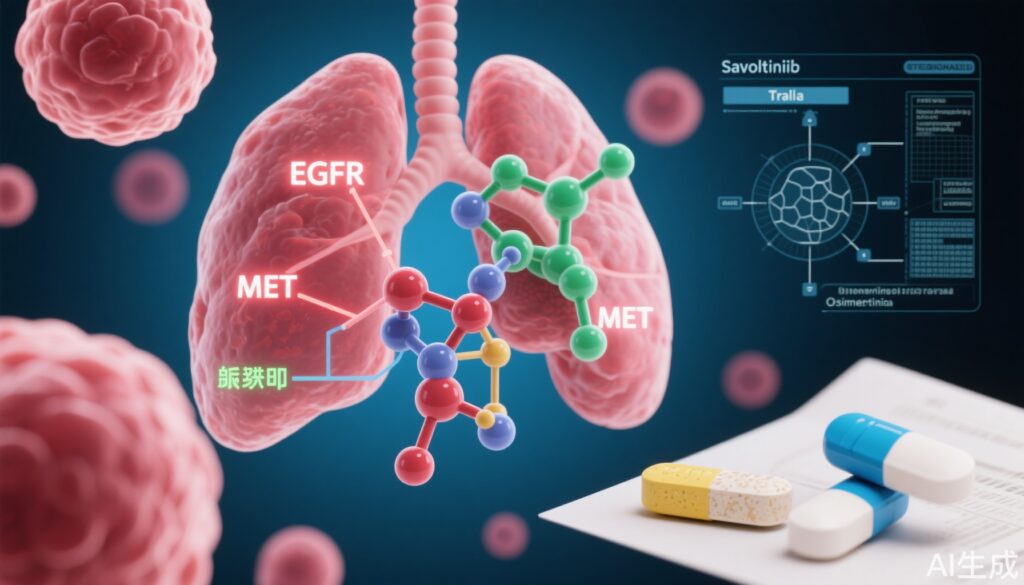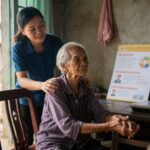Highlights
- MET-driven resistance is a frequent mechanism after first-line osimertinib in EGFR-mutated advanced non-small cell lung cancer (NSCLC).
- Savolitinib plus osimertinib achieved an objective response rate (ORR) exceeding 55% in patients with high MET overexpression/amplification post-osimertinib.
- The combination showed a median progression-free survival (PFS) of 7.4–7.5 months and was generally well tolerated.
- This regimen may establish a new oral standard for targeting MET-driven resistance following EGFR TKI therapy.
Study Background and Disease Burden
Epidermal growth factor receptor (EGFR) mutations are present in up to 15% of NSCLC cases in Western populations and up to 50% in East Asian populations. Osimertinib, a third-generation EGFR tyrosine kinase inhibitor (TKI), is now standard first-line therapy for EGFR-mutated advanced NSCLC. However, acquired resistance is inevitable, with MET gene overexpression or amplification emerging as a key resistance mechanism in 15–50% of patients who progress on osimertinib. Until recently, there were no approved oral, molecularly targeted options for this population, representing a significant unmet clinical need.
Study Design
The phase II SAVANNAH study (NCT03778229) was an open-label, multicenter trial evaluating the efficacy and safety of combining savolitinib (a selective MET inhibitor) with osimertinib in patients with advanced or metastatic EGFR-mutated NSCLC who had developed resistance to osimertinib due to MET overexpression and/or amplification. Patient eligibility required documented EGFR mutation (exon 19 deletion or L858R), progression on first-line osimertinib, and MET overexpression/amplification as measured by immunohistochemistry (IHC) or fluorescence in situ hybridization (FISH).
The primary efficacy population comprised patients with high MET status (IHC3+/≥90% and/or FISH10+) treated with savolitinib 300 mg twice daily plus osimertinib 80 mg once daily. The primary endpoint was objective response rate (ORR) by investigator assessment; secondary endpoints included duration of response (DoR), progression-free survival (PFS), and safety.
Key Findings
Among 365 patients enrolled, 341 received the investigational combination, with 80 constituting the primary efficacy cohort. Key outcomes in this group include:
– Investigator-assessed ORR: 56.3% (95% CI, 44.7–67.3%)
– Blinded independent central review ORR: 55.0% (95% CI, 43.5–66.2%)
– Median duration of response (DoR): 7.1 months (investigator, 95% CI 5.6–9.6); 9.9 months (central review, 95% CI 6.0–13.7)
– Median PFS: 7.4 months (investigator, 95% CI 5.5–7.6); 7.5 months (central review, 95% CI 6.4–11.3)
Safety analysis in all patients treated with savolitinib and osimertinib revealed manageable toxicity:
– Most common any-grade adverse events: peripheral edema (46.0%), nausea (40.5%), diarrhea (23.2%)
– Grade ≥3 adverse events were infrequent and consistent with known profiles of the individual agents.
These findings demonstrate both the activity and tolerability of the combination in a difficult-to-treat, molecularly defined population. Notably, the efficacy outcomes compare favorably with historical controls for chemotherapy and previously investigated MET inhibition strategies, which have shown lower response rates and shorter durations of benefit in similar settings.
Expert Commentary
The SAVANNAH study provides the strongest evidence to date for dual EGFR and MET inhibition in osimertinib-resistant, EGFR-mutant NSCLC with high-level MET alterations. The robust ORR and consistent PFS between investigator and central review support the reliability of these results. Importantly, the safety profile of the combination is acceptable, with no new safety signals identified, and the oral administration route is likely to be highly acceptable to patients.
Current guideline statements recognize the need for targeted approaches in MET-amplified, EGFR TKI-resistant NSCLC, but until now, no oral combination has shown such promising efficacy. Limitations include the single-arm design, lack of a comparator arm, and the need for stringent biomarker selection to identify optimal responders. However, the study’s enrichment for high MET expression/amplification mirrors real-world precision oncology strategies and sets a precedent for molecularly tailored therapy.
Mechanistically, savolitinib selectively inhibits MET kinase, thereby preventing bypass signaling that drives resistance to EGFR inhibition. Preclinical studies and prior small trials have suggested this approach can restore EGFR TKI sensitivity, and SAVANNAH’s data provide clinical validation for this rationale.
Conclusion
Savolitinib plus osimertinib offers a new, effective, and well-tolerated oral regimen for patients with EGFR-mutant advanced NSCLC and high-level MET overexpression/amplification following progression on first-line osimertinib. This combination addresses a major resistance mechanism and may shift the therapeutic paradigm for this molecularly defined subgroup. Future research should focus on optimizing patient selection, exploring resistance mechanisms to dual inhibition, and evaluating long-term outcomes in randomized controlled trials.
References
1. de Marinis F, Kim TM, Bonanno L, et al. Savolitinib plus osimertinib in epidermal growth factor receptor (EGFR)-mutated advanced non-small cell lung cancer with MET overexpression and/or amplification following disease progression on osimertinib: primary results from the phase II SAVANNAH study. Ann Oncol. 2025 Aug;36(8):920-933. doi: 10.1016/j.annonc.2025.04.003.
2. Soria JC, Ohe Y, Vansteenkiste J, et al. Osimertinib in untreated EGFR-mutated advanced NSCLC. N Engl J Med. 2018;378:113-125.
3. Wu YL, Cheng Y, Zhou X, et al. Dacomitinib versus gefitinib as first-line treatment for patients with EGFR-mutation-positive advanced non-small-cell lung cancer (ARCHER 1050): a randomized, open-label, phase 3 trial. Lancet Oncol. 2017;18(11):1454-1466.


